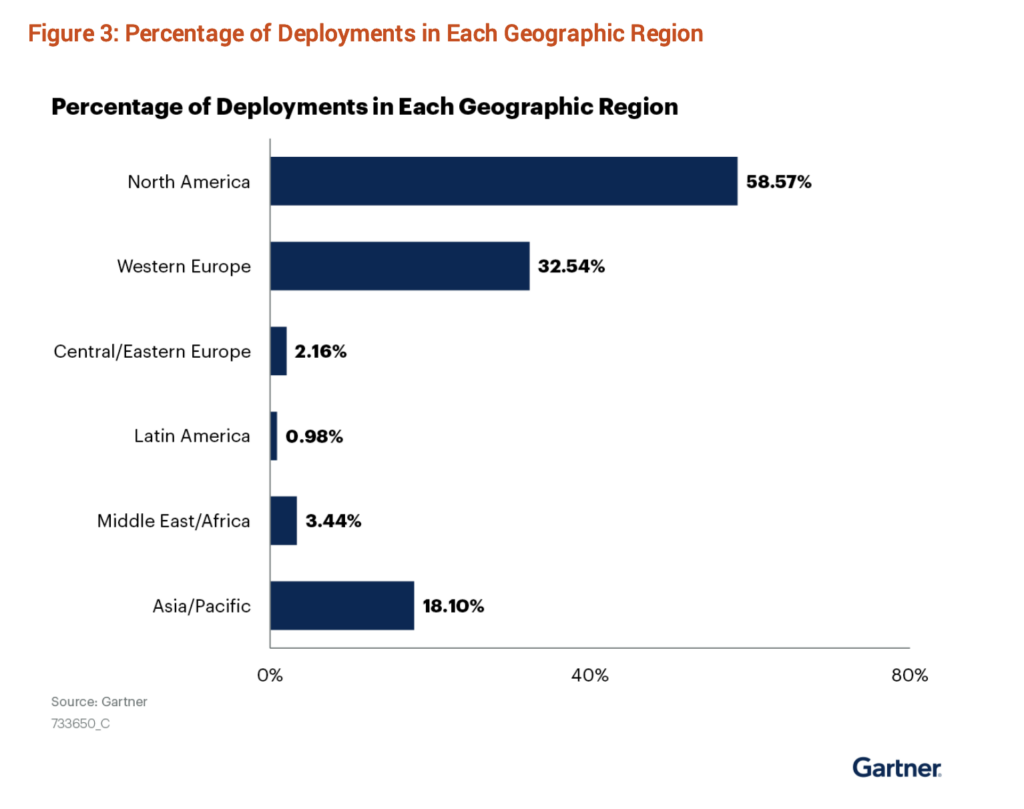欧洲、非洲和中东地区的新兴法律技术趋势
The pandemic affected industries throughout the world, and recent legal technology trends prove it. In some ways, the disruption wasn’t 所有 bad. In fact, as 福布斯》杂志 mentioned in a well-titled 条, “The Pandemic Might Be The Tech Disruptor The Legal Industry Needs”:
“This pandemic-prompted digital transition is just the beginning of a larger evolution for the legal profession that will lead to more efficiency, stronger security and better client service.”
Necessity is the mother of invention, and the COVID-19 pandemic certainly kicked the legal industry where it hurt.
To set the stage, let’s see how the most recent 顾特纳(Gartner)公司 “Market Guide for Enterprise Legal Management Solutions” presented a concise summary of the regional adoption level of ELM solutions.

Clearly, the strongest current presence is in North America and Europe. But there’s been movement elsewhere. With this in mind, let’s take a look at some of the more interesting legal technology trends some have identified in Europe, Africa and the Middle East.
Smaller legal firms are outpacing larger firms in technology
Among legal technology trends in Europe, we find smaller, specialist law firms 是 taking on entrepreneurial projects that are challenging larger firms to keep up. By thinking out of the box, these small firms are changing the traditional way of doing things and introducing new ideas that may well pave the way for the future.
In Poland, for instance, NGL Legal is expanding in a revolutionary manner. Instead of going the more traditional route of acquisition or hiring more employees, NGL Symbio is a 伙伴关系 between six different law firms throughout Central and Eastern Europe. By covering 50 jurisdictions, NGL Symbio’s clients are able to access the resources and expertise they need, and the firms collaborate as necessary.
In Portugal, Antas da Cunha Ecija & Associados have created a legal intelligence department. Their projects include various experiments to find technological solutions to challenges faced by lawyers, such as a knowledge management system that provides a single source of truth that retains the firm’s institutional knowledge and thus makes it easier to train junior lawyers.
Larger firms are getting creative to keep up
The pandemic has certainly forced an acceleration in creative, out-of-the-box thinking that’s showing up in legal technology trends. As winner and runner-up among the ‘Most Innovative Law Firms in Europe 2021’, DLA Piper and Allen & Overy are examples of larger, international firms that found ways to transform their business model 和 cater to clients who value long-term, big-picture thinking.
DLA Piper has created a wholly owned subsidiary, Aldersgate Holding, which invests in new technology (blockchain, for instance). While it’s funded by the partners, it has autonomy and is able to be far more agile than other firm management teams.
Allen & Overy created the Markets Innovation Group, or MIG, to focus on long-term project investments and to encourage more of a start-up culture. It is part of the firm, unlike Aldersgate Holding, but it’s treated like a client, with lawyers able to record their time spent on MIG projects as billable hours. The MIG has set up its internal investment fund, and this aims to raise capital for research and development. This creative approach will centralise investment in innovation, instead of seeking to raise funds for projects individually.
This example reminds us of how the American legal firm Keesal, Young & Logan launched its KP实验室 spinoff to work with corporate clients (and Mitratech) to advance legal technologies.

The European legal market is at its highest levels of optimism around legal spend
According to another newly released 研究, European law firms were able to grow over the past 18 months. This is fairly impressive, as it was a difficult year in terms of both the global upheaval and challenges caused by the COVID-19 pandemic, as well as added local disruptions such as the U.K.’s exit from the European Union.
Although Europe by nature is highly localized (making it difficult to form common, blanket conclusions), several key trends surface:
- Interpersonal Relationships – The global pandemic placed a spotlight on the importance of relationships between people, especially key clients and their favoured lawyers.
- Technology Innovation – The impact of new technology and innovation in legal services will be staggering. These developments will boost the importance of certain skills that clients look for in their legal partners, especially as hybrid working becomes the norm.
- Business savvy – It’s crucial to clients to have counsel that demonstrate a deep understanding of their business and industry.
“This pandemic-prompted digital transition is just the beginning of a larger evolution for the legal profession that will lead to more efficiency, stronger security and better client service.”
There’s a new generation of lawyers in Africa re-imagining legal tech
ǞǞǞ Global Legal Tech Report for Africa 2020 has recently revealed another of these legal technology trends. The study shows that at 53%, Africa has more younger legal tech company founders than countries in Asia, Australia and New Zealand.
Why does this matter? Because with fresh blood comes change.
“Not limited by legacy practices, this new generation of (legal entrepreneurs) in Africa are re-imagining the legal profession through Legal Tech,” said Eric Chin, a researcher at Alpha Creates.
According to the report, the majority of the continent’s legal tech firms are aiming to expand their operations across the global market, but with a strong preference for servicing local markets. The most preferred growth market is West Africa (75%), then Eastern Africa (67%) and Southern Africa (42%).
Legal adoption in the Middle East will begin with big legal departments
As one might 预想, it’s the larger, international companies and firms in the Middle East that are in the best position for adoption of legal technology. Often, their US, UK or European main offices will develop the technology to address specific challenges, and it will then trickle down to the Middle East branches.
On the other hand, large local companies and firms 还有 implement legal technology – they just do so without classifying it as such. For example, a Dubai-based law firm has a chat function on their website to enhance the customer experience, for instance, but they don’t label it as legal technology.
Clearly, these legal technology trends show us that digital transformation is gradually taking hold in legal processes and operations, both at the international and local level, but in extremely varied ways across all these regions.
探索同类最佳的法律管理解决方案
今天就发现一个适合你需求的解决方案 和 明天。


